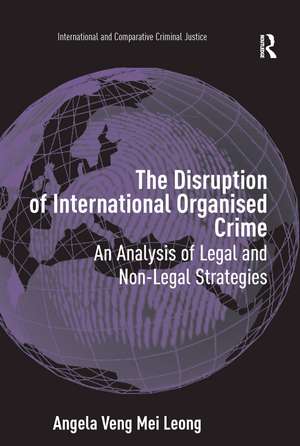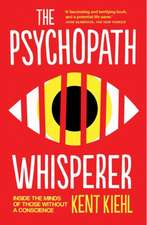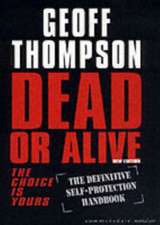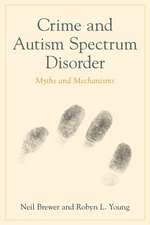The Disruption of International Organised Crime: An Analysis of Legal and Non-Legal Strategies: International and Comparative Criminal Justice
Autor Angela Veng Mei Leongen Limba Engleză Paperback – 11 noi 2016
| Toate formatele și edițiile | Preț | Express |
|---|---|---|
| Paperback (1) | 489.26 lei 6-8 săpt. | |
| Taylor & Francis – 11 noi 2016 | 489.26 lei 6-8 săpt. | |
| Hardback (1) | 824.70 lei 6-8 săpt. | |
| Taylor & Francis – 28 dec 2007 | 824.70 lei 6-8 săpt. |
Preț: 489.26 lei
Nou
Puncte Express: 734
Preț estimativ în valută:
93.62€ • 97.75$ • 77.48£
93.62€ • 97.75$ • 77.48£
Carte tipărită la comandă
Livrare economică 04-18 aprilie
Preluare comenzi: 021 569.72.76
Specificații
ISBN-13: 9781138257726
ISBN-10: 1138257729
Pagini: 292
Dimensiuni: 156 x 234 mm
Greutate: 0.45 kg
Ediția:1
Editura: Taylor & Francis
Colecția Routledge
Seria International and Comparative Criminal Justice
Locul publicării:Oxford, United Kingdom
ISBN-10: 1138257729
Pagini: 292
Dimensiuni: 156 x 234 mm
Greutate: 0.45 kg
Ediția:1
Editura: Taylor & Francis
Colecția Routledge
Seria International and Comparative Criminal Justice
Locul publicării:Oxford, United Kingdom
Cuprins
Contents: Foreword, Barry A.K. Rider; Preface; Introduction; Organised crime: definition and theoretical analysis; Criminal finance: money laundering and terrorist financing; Traditional law enforcement response to organised crime; Traditional legal response to organised crime; Controlling organised crime: the traditional criminal justice system; Controlling organised crime: the new perspectives; Legal implications and efficacy of 'disruption strategies'; Conclusions and policy implications: the way forward; Bibliography; Index.
Notă biografică
Dr Angela V. M. Leong, formerly a Researcher for the Treasury Select Committee, House of Commons and an Accredited Financial Investigator for the Assets Recovery Agency, is a frequent speaker on subjects relating to organised crime, money laundering, terrorist financing, economic and financial crime, civil recovery and confiscation legislation. She writes regularly for the Journal of Financial Crime, Journal of Money Laundering Control, The Company Lawyer and other publications. She is currently a Consultant to the European Commission AGIS Project on Organised Crime Infiltration and Insider Fraud. She is also an Associate Research Fellow at the Institute of Advanced Legal Studies, University of London; an Associate Fellow of the Centre for Criminology at the University of Hong Kong; an International Expert for the Hong Kong Civil Forfeiture Research Project funded by the Central Policy Unit of the Government of the Hong Kong Special Administrative Region; a Fellow and Adviser for the International Compliance Association; a Secretariat for the Cambridge International Symposium on Economic Crime at Jesus College, University of Cambridge, and a Member of the Institute of Professional Investigators.
Recenzii
'Dr Leong argues convincingly that almost all attempts to combat international organized crime in the past several decades should be considered abject failures. Her critical analysis of the traditional legal response to organized crime utilized by most Western countries - using control measures within the existing criminal law - makes for particularly sobering reading.' Law Society Journal
Descriere
This volume examines whether the deviant structures of organized crime, which are capable of operating trans-nationally, can be dealt with through traditional mechanisms working within national jurisdictions. In doing so, the book assesses the development of more effective national and international strategies for enforcing both civil and criminal sanctions on organized crime.



























